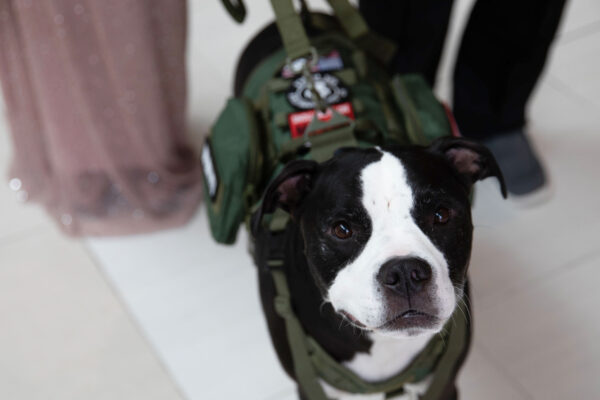
Service dog, Max Montgomery, attends the Enlisted Association of the National Guard President’s Reception in Detroit on August 19, 2024. (Photo: U.S. Army National Guard Cpl. Kaitlyn Wills)
Introduced during National Suicide Prevention Month and National Service Dog Month, the Service Dogs Assisting Veterans Act, led by Congressman Morgan Luttrell (R-Texas), seeks to help Veterans access trained service dogs.
Multiple Veterans organizations, including The American Legion, support this legislation. The bill, supported by lawmakers from both parties, proposes allocating $10 million annually for five years to create a grant program under the VA. The grants will be distributed to nonprofit organizations that train and provide service dogs to Veterans with disabilities, including PTSD, traumatic brain injuries, military sexual trauma, and/or physical impairments such as blindness or deafness.
The bill expands resources for Veterans dealing with both visible and invisible injuries sustained during service. Congressman Luttrell stated the critical role service dogs play in supporting Veterans long after they return home, offering essential assistance for their mental and physical well-being.
Service dogs are specifically trained to perform tasks that assist individuals with disabilities, such as retrieving medication or calming anxiety. For Veterans, these dogs provide crucial support in daily life, helping them regain independence and reintegrate into civilian society. Organizations like K9s For Warriors, which support this legislation, report that service dogs have a profound impact on Veterans’ mental health. A study published in JAMA Network Open shows that Veterans working with service dogs experience reduced PTSD symptoms, lower anxiety, and an improved overall quality of life.
Related article: NIH-FUNDED STUDY NOTES VETERANS AND SERVICE MEMBERS WITH SERVICE DOGS MAY EXPERIENCE FEWER SYMPTOMS OF PTSD.
Veterans’ advocacy groups such as Iraq and Afghanistan Veterans of America and Paralyzed Veterans of America have also endorsed the legislation, stating that the demand for service dogs far exceeds the current supply. The waiting period for receiving a service dog can stretch up to two years, a delay that can be detrimental for Veterans suffering from serious mental health challenges. The additional funding provided by this bill would help nonprofit organizations train more dogs and reduce wait times.
“The cost of us not doing this is we are going to lose more of our sons and daughters who were willing to put on the uniform and sacrifice everything for us,” said a co-sponsor of the bill, Congressman Morgan McGarvey, stressing the importance of this legislation.
The VA is currently piloting programs that provide service dogs to Veterans diagnosed with PTSD. While the VA has not yet commented on the pending legislation, this bill would significantly expand those efforts by funding organizations that specialize in connecting Veterans with service dogs.
Supporters of the Service Dogs Assisting Veterans Act see it as a critical step toward providing Veterans with the care and resources they deserve. With bipartisan support, the bill is expected to address both the high demand for service dogs and the financial barriers nonprofit organizations face in training and providing these life-saving animals at no cost to Veterans.













This sounds like a good program, I have voluntiered time to Canine Companions for Independence, which pairs wheel chair patients with trained dogs which assist with tasks such as picking up items and opening doors. These tasks can be difficult for wheelchair bound patients.